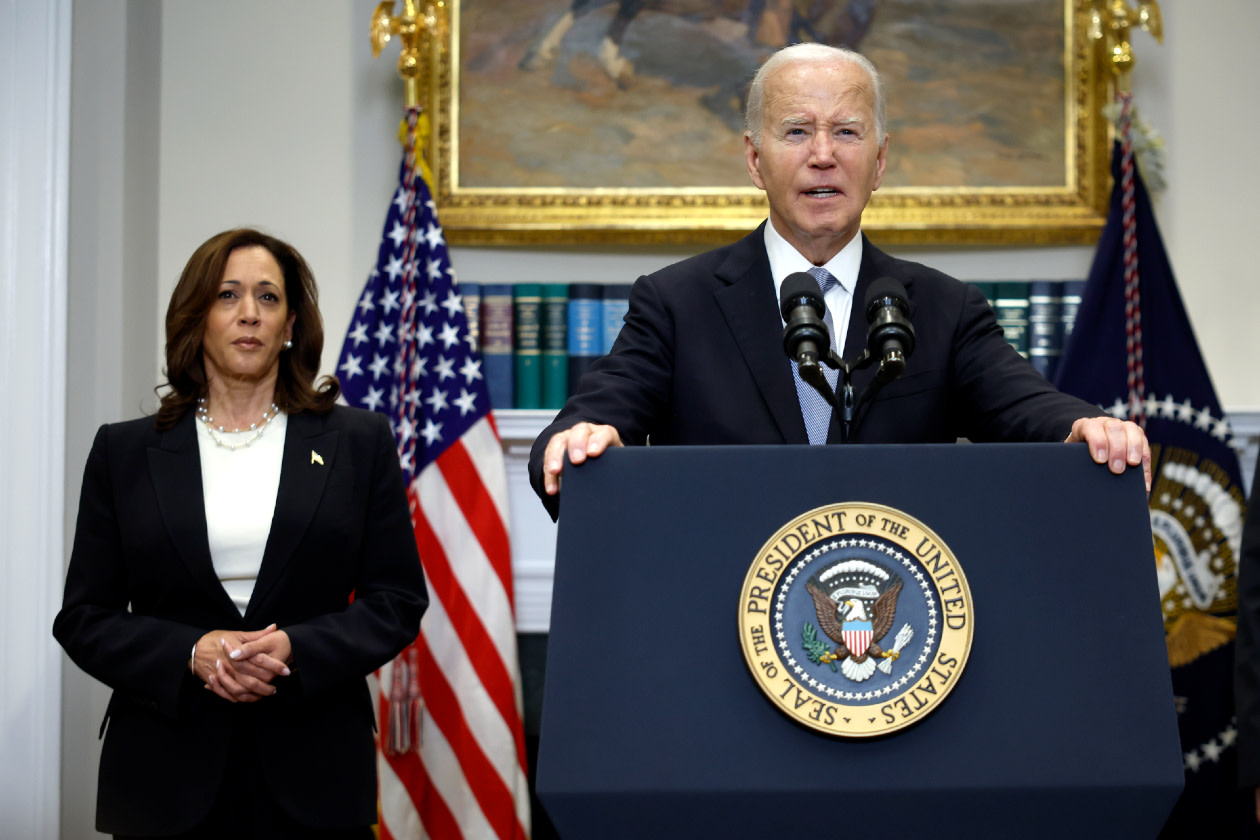Current US President, Joe Biden, stepped away from his re-election bid on Sunday 21 July. He’s backed current Vice President, Kamala Harris, to take the presidential bid forward for the Democrats.
The news doesn’t come as a huge surprise. Pressure had been building on the president since the TV debate between him and Donald Trump on 27 June, where Biden’s performance was considered ‘poor’ by many within his ranks.
Since then, there have been multiple calls for him to step aside from different parts of the Democratic party. This included the all-important party donors, and by the end of last week, with Biden isolating due to having COVID-19, this outcome started to seem inevitable.
What happens next?
Biden has backed Vice President Kamala Harris to run against Trump.
As was always the plan, the decision as to who will run against Trump will be made at the Democratic convention in August.
Since the announcement yesterday, a number of party donors have come out in support of Harris and she’s already managed to secure a substantial amount of new funding for her election bid.
With backing from California governor Gavin Newsom, Michigan governor Gretchen Whitmer and the Clinton’s, it’s widely expected that she will run against Trump.
This is potentially monumental for the US, with Harris attempting to be their first female US president in history.
Who is Kamala Harris and what does it mean for Democrats?
As current Vice President, Harris is already a senior member of the Democratic party and has been heavily involved in the current government.
That means it’s unlikely we’ll see large policy changes.
However, Harris is more passionate about some social issues than Biden was, and might want to bring things like gender equality and women’s rights more into focus.
This article isn’t personal advice. All investments and any income from them can rise and fall in value, so you could get back less than you invest. If you’re not sure whether a course of action is right for you, ask for financial advice.
What does it mean for investors?
From an investment perspective, some short-term volatility is expected as stock markets digest the change.
Trump’s probability of winning the presidency has fallen, from 66% to 61% (having been as high as 70% recently). There’s been a corresponding increase to Harris’ chances, which stand at 39% at the time of writing.
The initial reaction from investors was for US stock markets to open down later today, however that’s already shifted to an expectation that they’ll rise when they open.
The 10-year US Treasury bond yield fell initially (a common reaction to uncertainty) but has since ticked back up again.
This is unlikely to make any significant impact over the longer term though.
Two key themes have driven the US stock market in the last 18 months – the rise of artificial intelligence and its impact on tech stocks, and the Federal Reserve’s (Fed) interest rate policy.
For tech stocks, this month’s earnings season will be key to determining the sector’s future, and for the Fed, we expect a rate cut in September.
Even if Trump still wins, which is still looking the likely outcome, early opinion polls are suggesting that the result might now be more balanced than was predicted a week ago.
This is important because a closer result could reduce the chances of some more ‘extreme’ policies – a situation that markets would probably prefer and which could be better for US bond yields.
A tighter election campaign will likely bring more short-term ups and downs in markets though – both in shares and bonds.
As ever, investors should make sure they have good diversification in their portfolios to help smooth this expected volatility.
The US makes up over half of the global stock market. It’s the world’s biggest economy and home to some of the globe’s largest companies.
It’s quite simply too big to ignore.
If you’re looking for an innovative way to invest in the US, you could consider the HL US Fund.
HL’s experts have hand-picked a team of external fund managers who they believe offer the best potential for long-term performance.
This fund aims to invest in US shares for long-term growth. And could be used by people who are comfortable building their own portfolios.
This fund is managed by Hargreaves Lansdown Fund Managers Ltd, part of the Hargreaves Lansdown Group.
Article image credit: Kevin Dietsch/Getty Images.




